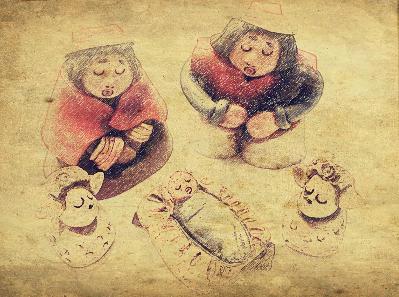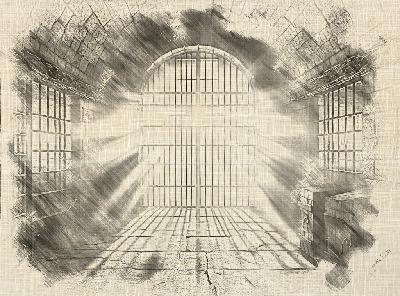The Humble Incarnation: Lessons from ‘Away in a Manger’
Description
I. The Whisper of Divinity in Simplicity
In the quiet corners of our hearts, where the world’s clamor fades to a distant murmur, we find ourselves drawn to the gentle melody of “Away in a Manger.” This beloved hymn, oft attributed to the great reformer Martin Luther, beckons us to pause and contemplate the profound mystery of the Incarnation. As we delve into its verses, let us allow the Holy Spirit to illuminate the depths of meaning hidden within its simple words, for in simplicity often lies the most profound truth.
The opening lines paint a picture of stark humility: “Away in a manger, no crib for a bed, the little Lord Jesus laid down His sweet head.” Here, in the crude shelter of a stable, the King of Kings makes His entrance into our world. How different this is from the opulence we often associate with royalty! Yet, is this not the very essence of our Lord’s character? As Paul reminds us in Philippians 2:7-8, Christ “emptied himself, by taking the form of a servant, being born in the likeness of men. And being found in human form, he humbled himself by becoming obedient to the point of death, even death on a cross.”
Luther himself spoke of this divine humility, saying, “God’s strength is made perfect in weakness. All the works of God are done in defiance of human reason.” In the weakness of an infant, in the poverty of a manger, we find the strength of God made manifest. How often do we, in our human frailty, seek strength in the wrong places? Do we not often clothe ourselves in the garments of worldly success, thinking they will shield us from our vulnerabilities?
II. The Cosmic Gaze Upon the Creator
As we continue our meditation, we encounter a beautiful paradox: “The stars in the heavens looked down where He lay.” Here, the very celestial bodies that He created now gaze upon their Creator, confined to the form of a helpless babe. This image evokes the words of Colossians 1:16-17: “For by him all things were created, in heaven and on earth, visible and invisible, whether thrones or dominions or rulers or authorities—all things were created through him and for him. And he is before all things, and in him all things hold together.”
In this simple line, we are confronted with the mystery of the Incarnation in all its mind-bending glory. The One who spoke the stars into existence now lies beneath their gaze, unable to speak, dependent on the care of His earthly parents. Luther, in his Christmas sermon of 1530, captures this paradox beautifully: “The mystery of the humanity of Christ, that He sunk Himself into our flesh, is beyond all human understanding.”
As we contemplate this cosmic reversal, let us ask ourselves: Do we truly grasp the magnitude of what occurred that night in Bethlehem? In our modern Christmas celebrations, with their twinkling lights and shiny ornaments, do we remember that the true Light of the World came not in a blaze of glory, but in the quiet darkness of a humble stable?
III. The Silent Cry of Redemption
The second verse of our hymn presents us with another paradox: “The cattle are lowing, the Baby awakes, but little Lord Jesus, no crying He makes.” This image of a silent, uncomplaining Christ-child has captured the imagination of believers for generations. Yet, we must be careful not to romanticize this to the point of denying Christ’s full humanity.
Scripture tells us that Jesus was “made like his brothers in every respect” (Hebrews 2:17 ). This includes the full range of human experiences and emotions. The absence of crying in this hymn, then, perhaps points us to a deeper truth – the willing submission of Christ to the Father’s will, even from His earliest moments on earth.
Luther, in his explanation of the second article of the Apostles’ Creed, reminds us of the purpose behind Christ’s coming: “I believe that Jesus Christ, true God, begotten of the Father from eternity, and also true man, born of the Virgin Mary, is my Lord, who has redeemed me, a lost and condemned person.”
In the silent contentment of the Christ-child, we see foreshadowed the silent submission of the man Jesus to the cross. As Isaiah prophesied, “He was oppressed, and he was afflicted, yet he opened not his mouth; like a lamb that is led to the slaughter, and like a sheep that before its shearers is silent, so he opened not his mouth” (Isaiah 53:7).
IV. The Intimate Plea for Divine Presence
As we move to the final verse, we find the hymn shifting from narrative to prayer: “Be near me, Lord Jesus; I ask Thee to stay close by me forever and love me, I pray.” Here, the distant scene of the nativity becomes intensely personal. The baby in the manger is no longer just a historical figure, but a present reality, a living Lord whom we can address directly.
This plea for Christ’s presence echoes the promise He made to His disciples: “And behold, I am with you always, to the end of the age” (Matthew 28:20 ). It reminds us that the Incarnation was not a one-time event, but the beginning of an eternal communion between God and humanity.
Luther, in his commentary on Galatians, speaks of this intimate relationship with Christ: “Faith connects you so intimately with Christ, that He and you become as it were one person. As such you may boldly say: ‘I am now one with Christ. Therefore Christ’s righteousness, victory, and life are mine.'”
In a world that often feels chaotic and unpredictable, do we truly embrace this promise of Christ’s constant presence? Do we, like the hymn writer, actively seek and cherish that presence in our daily lives?
V. The Universal Embrace of Divine Love
The hymn concludes with a broadening of perspective: “Bless all the dear children in Thy tender care, and fit us for heaven, to live with Thee there.” Here, we are reminded that the love of Christ is not exclusive but all-encompassing. The babe in the manger came for all of humanity, to bring all of God’s children into His family.
This echoes the words of John 3:16-17: “For God so loved the world, that he gave his only Son, that whoever believes in him should not perish but have eternal life. For God did not send his Son into the world to condemn the world, but in order that the world might be saved through him.”
Luther, in his explanation of the Lord’s Prayer, reminds us of the expansive nature of God’s kingdom: “God’s kingdom comes when our heavenly Father gives us His Holy Spirit, so that by His grace we believe His holy Word and lead godly lives here in time and there in eternity.”
As we sing these words, we are challenged to expand our own circle of love and concern. In a world often divided by differences, do we truly embrace all of God’s children as our brothers and sisters? Do we actively work towards the coming of God’s kingdom, where all are welcome at the table?
VI. The Contrast with Modern Extravagance
As we reflect on the profound simplicity of “Away in a Manger,” we cannot help but be struck by the stark contrast it presents to much of our modern Christmas celebrations. The humble scene of the nativity stands in sharp relief against the backdrop of our often extravagant and commercialized holiday practices.
Where the Christ-child had “no crib for a bed,” we often find ourselves caught up in a whirlwind of gift-buying and house-decorating. Where the stars provided the only illumination for the holy family, we string up thousands of twinkling lights. Where the cattle’s lowing was the background music to the nativity, we fill our homes and public spaces with a constant stream of holiday tunes.
There is, of course, nothing inherently wrong with celebration. Indeed, the birth of our Savior is the most joyous event in human history, worthy of our most exuberant praise. Yet, we must ask ourselves: In our modern Christmas practices, have we perhaps lost sight of the profound simplicity and humility that marked Christ’s entrance into our world?
Luther, ever the champion of grace over works, warns us against missing the true meaning of Christmas: “The inn was full; no one would release a room to this pregnant woman. She had to go to a cow stall and there bring forth the Maker of all creatures because nobody would give way. Shame on you, wretched Bethlehem! The inn ought to have been burned with brimstone, for even though Mary had been a beggar maid or unwed, anybody at such a time should have been glad to give her a hand.”
Are we, in our rush to create the perfect Christmas experience, sometimes guilty of having “no room in the inn” for the true meaning of the season? Do our celebrations point people towards the humble Christ-child, or do they merely reflect our own desires for comfort and abundance?
VII. Reclaiming the Spirit of the Manger
As we conclude our reflection on “Away in a Manger,” let us consider how we might reclaim the spirit of humility and simplicity that it embodies. This is not a call to abandon all celebration, but rather an invitation to infuse our Christmas practices with deeper meaning and purpose.
Perhaps we might take time amidst the holiday rush to sit in quiet contemplation of the nativity scene, allowing the profound mystery of the Incarnation to wash over us anew. We might choose to redirect some of our holiday spending towards those in need, embodying the selfless love that Christ demonstrated in leaving His heavenly throne for a humble manger.
We might gather our families to read the Christmas story from Scripture, helping our children to see beyond the shiny wrapping paper to the true gift of God’s love. We could seek out opportunities to serve others during the holiday season, remembering that Christ came not to be served, but to serve.
Luther reminds us of the true joy of Christmas:
























